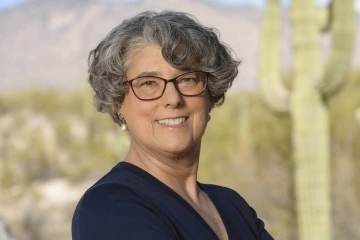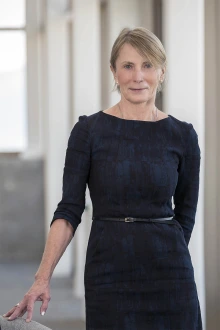Addressing the Grand Challenges of Aging Through Multidisciplinary Seed Grants
Innovations in Healthy Aging is advancing the study of age-related health topics by funding innovative new research in several different areas.

The University of Arizona Health Sciences recently announced five new recipients of Innovations in Healthy Aging seed grant funding, designed to support research that targets diseases of aging, including Alzheimer’s disease and skin cancer, addresses health challenges related to optimal aging, such as loneliness, distress and thermal comfort, and expands communities and activities for older adults.

Esther M. Sternberg, MD, is the associate director for biomedical and environmental research for Innovations in Healthy Aging and professor of medicine in the UArizona College of Medicine – Tucson.
“We want to leverage the existing strengths in aging that we have as an institution and enhance them in a variety of ways to create an age-friendly university that interacts closely with our community,” said Esther M. Sternberg, MD, associate director for biomedical and environmental research for Innovations in Healthy Aging and professor of medicine in the UArizona College of Medicine – Tucson. “Seed grants are one of the ways in which we can achieve this by encouraging and supporting researchers from across the entire university to collaborate and turn their attention to issues that address optimal aging.”
The five funded proposals emerged from a “Research Grand Challenges in Healthy Aging” workshop held in January. Grand Challenges seed grants will support the following projects and researchers:
- “Virtual Experiences to Reduce Loneliness and Psychosocial Distress Among Older Black Church Members” led by Kelly Palmer, PhD, assistant professor, Department of Health Promotion Sciences, UArizona Mel and Enid Zuckerman College of Public Health. Co-investigators: Erika D. Gault, PhD, assistant professor, Department of Africana Studies, UArizona College of Humanities; Bryan Carter, PhD, associate professor, Department of Africana Studies, College of Humanities
- “Exploring and Identifying Communities Where I Belong: Arts-Based, Person-Centered Book Making Workshop” led by Yumi Shirai, PhD, assistant professor, Department of Family and Community Medicine, College of Medicine – Tucson. Co-investigators: Lynne T. Tomasa, PhD, assistant professor, Department of Family and Community Medicine, College of Medicine – Tucson; Jennie M. Gubner, PhD, assistant professor, Fred Fox School of Music, UArizona College of Fine Arts
- “Personal Thermal Comfort Management and Minimized Building Energy Consumption via Ambient Light Exposure for Optimal Thermal Comfort in Older Adults” led by Qing Hao, PhD, associate professor, Department of Aerospace and Mechanical Engineering, UArizona College of Engineering. Co-investigators: Johnny Ray Runyon, PhD, assistant research professor, Department of Environmental Science, UArizona College of Agriculture and Life Sciences; Altaf A. Engineer, PhD, assistant professor, School of Architecture, UArizona College of Architecture, Planning and Landscape Architecture; Matthias R. Mehl, PhD, professor, Department of Psychology, UArizona College of Science; Gustavo de Oliveira Almeida, PhD, coordinator, UArizona Health Sciences Sensor Lab; Karen E. Parker, MD, PhD, clinical assistant professor, Department of Medicine, College of Medicine – Tucson
- “Tumor-specific T Cell Responses in Skin Cancer with Aging” led by Karen Hastings, MD, PhD, associate professor, Department of Basic Medical Sciences, UArizona College of Medicine – Phoenix. Co-investigator: Janko Nikolich-Žugich, MD, PhD, professor and head, Department of Immunobiology, College of Medicine – Tucson
- “Treatment of Language in Alzheimer’s Disease Combining Behavioral Therapy with Noninvasive Neuromodulation Informed by Measures of Neural Responsiveness” led by Aneta Kielar, PhD, assistant professor, Department of Speech, Language and Hearing Sciences, College of Science and BIO5 Institute member. Co-investigators: Pelagie Beeson, PhD, CCC-SLP, professor, Department of Speech, Language and Hearing Sciences, College of Science; Steven Rapcsak, MD, associate research professor, Department of Neurology, College of Medicine – Tucson; Kindle Rising, MS, CCC-SLP, research speech-language pathologist, Department of Speech, Language and Hearing Sciences, College of Science; Dianne K. Patterson, PhD, neuroimaging staff scientist, UArizona Office of Research, Innovation and Impact
Over the past year, Innovations in Healthy Aging has supported 14 projects through seed funding totaling $646,167. The goal is to allow researchers to gather pilot data to use in applications for external funding from large national organizations.

Kathleen Insel, PhD, RN, is interim dean of the UArizona College of Nursing and the director of Innovations in Healthy Aging.
Three projects were selected during an initial round of healthy aging seed grants funded with $75,000 provided by UArizona Health Sciences. Three more projects were supported using initiative funding after Zhao Chen, PhD, MPH, distinguished professor and interim chair of the Department of Epidemiology and Biostatistics at the Zuckerman College of Public Health and BIO5 Institute member, led a call for behavioral science proposals.
A separate round of “living lab” seed grants funded three projects that focused on healthy aging in the built environment. The idea was to encourage researchers to incorporate wearable sensors to measure the impact of different aspects of the environment on different aspects of health, well-being and performance in older adults.
“We are achieving what we set out to achieve when we started a year ago,” said Dr. Sternberg, director of research at the College of Medicine – Tucson’s Andrew Weil Center for Integrative Medicine and BIO5 Institute member. “We are stimulating interdisciplinary research in various aspects of healthy aging, and we have new researchers coming into the fold.”
In addition to Drs. Sternberg and Insel, the Innovations in Healthy Aging research advisory committee includes: Mindy Fain, MD, professor and Anne and Alden Hart Endowed Chair in Medicine, College of Medicine – Tucson, and co-director, UArizona Center on Aging; Jim Buizer, PhD, associate director, Aegis Consortium, and professor, College of Agriculture and Life Sciences; Rebekah Coskun, DrPH, research development associate, Office for Research, Innovation and Impact; Gustavo de Oliveira Almeida, PhD, coordinator, Sensor Lab; Jordan Karp, MD, department chair and professor, Department of Psychiatry, College of Medicine – Tucson; Nancy Pollock-Ellwand, PhD, dean, College of Architecture, Planning and Landscape Architecture; Janet Meiling Roveda, PhD, professor, Department of Electrical and Computer Engineering and of Biomedical Engineering, College of Engineering and BIO5 Institute member; Robert Wilson, PhD, associate professor, Department of Psychology, College of Science.
Contact
Blair Willis
520-626-2101
bmw23@arizona.edu

